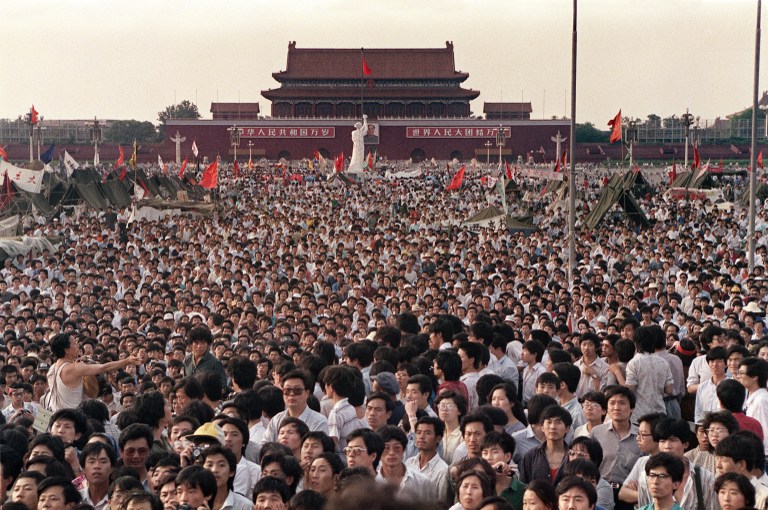This year marks the 30th anniversary of the nationwide, student-led democracy movement in China, and the subsequent military crackdown in Beijing. To mark the occasion, CDT is posting a series of original news articles from that year, beginning with the death of Hu Yaobang on April 15 and continuing through the tumultuous spring.
From Nicholas Kristof’s report in the April 28, 1989 New York Times:
More than 150,000 demonstrators openly defied official warnings and a concentration of troops today to march for 14 hours through the capital, repeatedly and effortlessly puncturing lines of policemen and soldiers sent to stop them, in one of the biggest displays of dissatisfaction in 40 years of Communist rule.
The student-organized demonstration in support of democracy and against corruption was a stunning humiliation for the Government, which responded this evening by agreeing conditionally to the students’ demand for discussions with officials.
Most worrying for the authorities was the fact that crowds of cheering workers lined the entire route and hailed the core of student marchers almost as a liberating army. Workers vigorously applauded the students, waved encouragement from office windows, and frequently sent them food and drinks to show support. Soldiers Are Surrounded
On at least three occasions thousands of workers surrounded hundreds of soldiers and and prevented them from approaching student marchers. [Source]
And from an accompanying report by Sheryl WuDunn:
The views of the students vary enormously, as do their sense of conviction and their ability to articulate a vision of democracy. Many students have scarcely thought about it, and in the last 10 days, they have marched to Tiananmen Square, the political center of the nation, to watch the spectacle and perhaps shout a few slogans along with the crowd.
”I don’t know exactly what democracy is,” said a 22-year-old physics student from Tianjin University. ”But we need more of it.”
What emerges from interviews with several dozen students over the last few days is the feeling that democracy is as much a moral issue as a political one: that it would bring about a cleansing of the corruption that many people believe has become customary for Government officials in China.
[…] Many students admit that there is little likelihood their demands will bring about immediate change. In some ways, the movement is an attempt to deepen their own understanding of democracy and to spread it among their fellow students. But they also hope to influence the leaders or at least the representatives to the National People’s Congress, China’s legislature, which meets once a year. [Source]
See also raw footage from April 27 in Beijing by German public broadcaster ZDF.
[This series was originally posted by CDT in 2009 to mark the 20th anniversary of the protests. If you have access to additional sources of original reporting, video, accounts or photos from the spring of 1989, please send them to us at cdt@chinadigitaltimes.net and we’ll consider including them in this series. Many thanks.]








